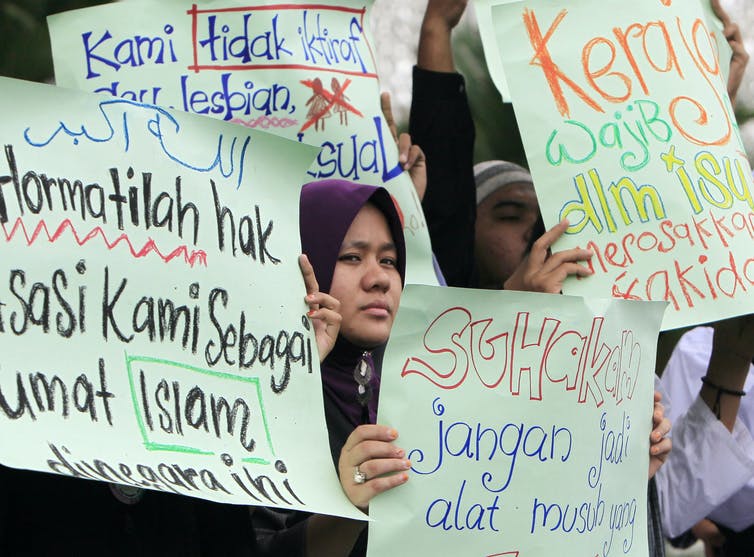Same-sex relationships in Malaysia are not only illegal, their existence is also completely denied: In March 2019, the tourism minister of Malaysia said that there were no gay people in the country. This is evidently not true, but LGBT+ people do not receive any protection from the state, and discrimination based on sexual orientation or gender identity is not prohibited. Since 2018, this anti-gay sentiment has intensified and assaults on LGBT+ people have increased. Most recently, a judgement by the Federal Court of Malaysia has introduced a ray of hope of change for the better.
LGBTQ+ rights in Malaysia
According to the LGBTQ+ Danger Index, Malaysia is the 9th most dangerous place (out of 150 countries) for LGBTQ+ people to travel to, with a danger index of -117. This is mainly based on the Malaysian Penal Code. Section 377A and 377B leg. cit. criminalise “carnal intercourse against the order of nature”, which is described as any form of anal or oral sex, with up to 20 years imprisonment and whipping.
This law has been introduced by British colonial legislation, as it has been in many other colonies under the control of the UK. Laws outlawing consensual gay sex were left in place after independence in most countries and in 47 countries which were formerly part of the British Empire, same-sex relationships are still illegal today. Currently, 34 out of the 54 commonwealth countries criminalise homosexuality. India is one of the few examples that repealed Section 377 when the Supreme Court decriminalised consensual homosexual intercourse in 2018, almost 160 years after its introduction by the British rulers.
However, in Malaysia, the current criminalisation of same sex relationships is also supported by Sharia law which is – in addition to federal laws – applicable to the almost 20 million Muslims living in Malaysia, representing more than 60% of the population. According to Article 3 of the Constitution, Islam is the religion of the federation, and consequently, Malaysia has Sharia courts in all its states (alongside federal courts) which exercise jurisdiction over limited private violations of Islamic norms, such as female same-sex activity, male same-sex activity, or cross-dressing. These norms are applied to the Muslim population in all 13 states through state laws, which carry punishments varying from 2 months up to 3 year imprisonment, and/or whipping.
Nonetheless, the ban on sexual acts against the order of nature has been rarely enforced in the past, despite the persistent discrimination against sexual minorities. Malaysia’s oldest gay bar in Kuala Lumpur, which had operated without incident for 30 years, was only raided in August 2018. In recent years, Malaysian courts have imposed corporate punishments on same sex relations, as was the case for two women who were caned in 2018 as well as five men in 2019. Moreover, the federal law has also been used for political motivations: The Malaysian opposition politician Anwar Ibrahim was imprisoned twice under Section 377 and maintained that the sodomy charges were part of a smear campaign against him.
Hope for the future
The first step in the right direction has been taken on 25 February 2021, when a man won his appeal against an Islamic ban on gay sex in the highest federal court in Malaysia. He was charged with attempted sex against the order of nature with another man under Section 28 of the Shariah Criminal Offences (Selangor) Enactment, but the court ruled that the Islamic provision on state level is unconstitutional, since the subject matter is already legislated on national level in Section 377. Hence, the Selangor authorities had no power to enact the law. This decision was therefore based on the fact that the Selangor legislation was ultra vires, not due to LGBT+ friendly views.
Regardless, this decision is a significant move towards LGBT+ rights in Malaysia since most convictions for gay sex or attempts of gay sex are actually based on states’ Islamic laws and not on the federal Section 377. The decision was also made in a crucial moment because in January 2021, the deputy minister for religious affairs submitted a proposal to amend Act 355, which regulates the sentences that can be imposed by Sharia courts. This was an attempt to strengthen criminal penalties against LGBT+ carried out under state Sharia law. The deputy minister even urged the public to report “unhealthy” activities of LGBT+ groups, so that authorities could facilitate action against them.
Yet, an online survey in 2016 showed that 28% of the population strongly disagreed with the criminalization of being LGBT+, while 37% had no opinion on the topic or somewhat disagreed with it. Only 24% respondents strongly agreed with the criminalization. In 2018, the UN Committee on the Elimination of Discrimination against Women recommended awareness-raising measures to eliminate discrimination against LGBT women, to amend the corresponding laws and to end all “correction” or “rehabilitating” measures.
Laws criminalising consensual same sex conduct and relationships constitute violations of many human rights, including the right to health, dignity, equality before the law, equal protection of the law, freedom of discrimination and freedom of expression. Additionally, if the punishment is whipping or canning, the freedom of torture is infringed. Laws of this type are inherently discriminatory and prevent people of various sexual orientations to gain access to health, or economic, social and cultural rights. The government of Malaysia should realize that every human has the right to be treated with dignity, and no one should be treated as an outcast to society based on their sexual orientation.
Click here to support LGBT+ groups and communities in Malaysia.

